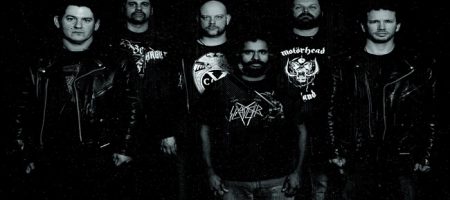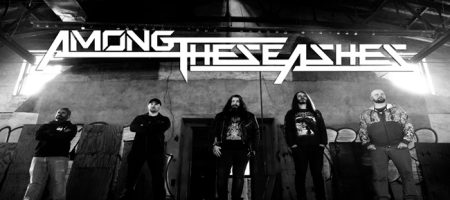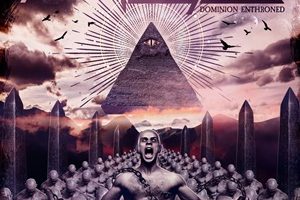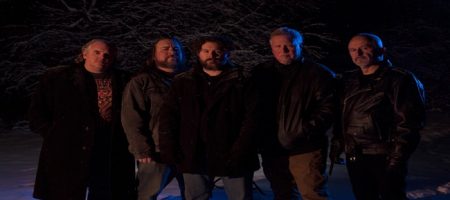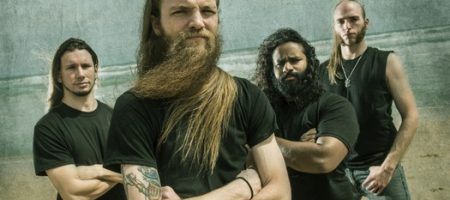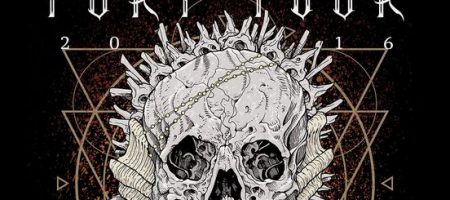Battlecross – Power Up
Sunday, 23rd August 2015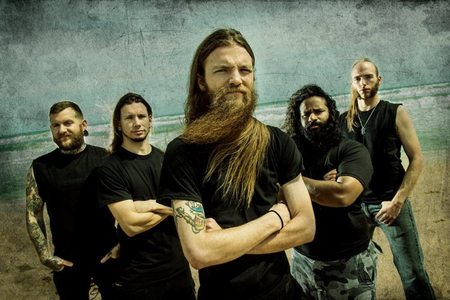
Banter in circles small and large goes around regarding the future leaders of metal. Will anyone ever ascend to ‘household’ word status, able to fill arenas and headline festivals in a single bound after bands like Iron Maiden and Metallica retire? Given the physical sale slowdown of product and flooded touring marketplace, it’s anybody’s guess if there will be bands in their 20’s and 30’s able to sustain that void on a large level – but in terms of quality from all facets of recording to live performance, one act who continue to rise to the challenge is Michigan’s Battlecross.
Since signing with Metal Blade and releasing their Pursuit of Honor effort in 2011, the blue-collar melodic thrash/death act has been a fixture on the touring circuit over the past 4+ years. Between festivals like Trespass and Mayhem to tours with In Flames, Crowbar, Death Angel, and others, if you are a regular attendee to get your metal fix in the clubs or theaters, there’s a solid chance you’ve experienced Battlecross live – and walked away a convert.
Rise to Power is the latest full-length – filled to the brim with all the heaviness, speed, groove, roars, screams, melodies, and harmonies we’ve come to know and love from the band. Calling from home expectant first-time father Tony Asta is very excited to see where the next adventure lies for the quintet – as we discuss everything from jamming Thin Lizzy with Crowbar’s Kirk Windstein, white knuckle western Canadian travel in the winter, and his personal definition of success besides the normal new album chatter.
Dead Rhetoric: How was it touring North America recently with the legendary Crowbar? Any special moments/ takeaways that will stay in the memory bank for a long time?
Tony Asta: Totally, it was an awesome tour. The Crowbar guys are super cool, cooler than I would have expected. Before that I had only seen them one time in concert, and they were just massive. When we found out we were going to do this tour with them, we said ‘hell yeah, this is going to be awesome!’ It lived up to that, just getting to know the guys and seeing them play every night is an amazing privilege. One thing that stands out in my mind for me was they invited us on their band wagon to hang out a few times after the show. We listened to music, drank beer, talked and I can picture Kirk Windstein in my mind just jamming along to some Thin Lizzy. He would play along to it, I couldn’t believe it was happening right in front of me. I walked away with a very positive feeling, they know what they are doing and everything was really chill. The Lord Dying guys are super chill too, a real heavy band and they are really great guys. It was awesome to get to know them as well- we definitely made some friends out of this tour.
Dead Rhetoric: Has Alex Bent’s presence hopefully solidified the drummer position in the band?
Asta: Definitely man. Alex is a one of a kind, young, hungry and versatile drummer. In my eyes he’s exactly what was needed for Battlecross. We are very happy to have him on board. Alex is a beast.
Dead Rhetoric: Rise to Power is the latest Battlecross album – how do you feel about the musical chemistry and songwriting within the band at this juncture in the band’s career? Do you enjoy the start to finish process of recording more and more, or are their mental/physical challenges and deadlines that you have to overcome?
Asta: We are very confident in the album and very confident in the music, especially this time around. It really helped in the writing process. Going into the studio, working at Audiohammer with Jason Suecof and Mark Lewis, that’s a big deal. That really helps shape how the album is going to turn out, from my perspective. Just knowing how they work and that they put it all on, they know what they are doing and they know their craft so well – we knew we had to shoot for Audiohammer and make it happen. Thanks to Metal Blade and our management, we were able to make it happen. It was awesome working one on one with Jason, he’s got a lot of good ideas that made certain parts stand out even more. He really pushed individually to really (make us) perform at our best, and it turned out amazing.
Dead Rhetoric: “The Path” is definitely a little bit of a departure especially with the acoustic guitar intro and building twin guitar harmonies in the opening segments. How did this track evolve, as I feel it’s an incredible closer?
Asta: That song was sort of my baby I guess. I knew where it was going, be more of a well-rounded song because it has so much in it. It starts off with that acoustic intro, and then it has sort of a build-up, sort of like something that Metallica would do back in the day. That’s the parallel that I see as far as my influences. Then the vocals kick in, the chorus has this great hook with the melody and its fast, then we bring it back down again only to kick it back up again. We have a swinging, bluesy part for the solo and Jason Suecof played that solo, that’s his guest solo. This is what I wanted to do, it came to life in the studio when everybody added their own parts.
Dead Rhetoric: Would Battlecross ever consider introducing any semblance of clean vocals for contrast, or do you believe Kyle’s attack works best in terms of his growls and screams?
Asta: My personal opinion is I don’t even want to do clean vocals in this band. That’s never been something that I would want to have in the band- if he feels he wants to do that, that’s his own thing. That hasn’t ever happened, that’s just my take on it. If the part calls for it, that would be one thing, but we’ve never been in that situation. The songs don’t ever really call for that from our perspective- maybe somebody else’s perspective, I don’t know.
Dead Rhetoric: The band seems to be very skilled at balancing out a lot of current power attack techniques while also delving out a lot of old school melodic harmonies and tricks. Are there songs that go through a number of transformations, and are you the type of guitar player that prefers multiple takes for particular lead breaks or does spontaneity work best?
Asta: There are a couple of songs that went through some drastic transformations. Then there are other songs that stayed very close to how the original idea was presented with minor changes, and then there are songs with everything in between. It depends on the song and what we are feeling. As far as the leads, (for) myself I really like to have calculated leads. I don’t shine ripping and playing whatever fast, that’s not my thing. I like to play notes that mean something in the moment, memorable, and something that has a little taste to it. I have dabbled in a little bit of things like tapping. It depends on the part, what it calls for, and what sounds the best. We want to complement the music in that particular lead break, that’s the way I take it because complimenting the music makes things stand out.
Dead Rhetoric: Are there times where you and Hiran may try out a lead break to see who works out best or are there times where you know who is going to tackle the parts?
Asta: Basically what we do… leads are one of those things that are the later elements that happen when writing a song. It will get to the point where we like it and then it may change a bit in the studio. For us if I hear something, I start messing with it, write it, and record it and put it into the song as an idea- then it kind of becomes my lead. And the same with Hiran – it wouldn’t necessarily be that I would write something for him and he would write something for me. I’ve been practicing a lead for a couple of months, so it’s something that I will record, that’s what it is and the same with him. I would keep practicing it and trying it until I got it.
However there are some things where he or I would write a harmony lead part where both guitars are required to play it, execute the harmony. Depending on who wrote it and who has to show the other how to play it, that would typically be for a live thing – if I wrote the harmony, I would play it in the studio, and if he wrote the harmony he would play it in the studio. For rhythm tracks, whoever can play the rhythm track the best in the studio, they would be the person to play (it). Whatever song Hiran or I wrote the most of, we would know the best so that person would be better off playing it. Under those circumstances, that’s how it will begin.
Dead Rhetoric: Describe the relationships you’ve built over the years with your fans – as it seems to be something that’s more about the quality interactions versus just a casual numbers game for the band?
Asta: It definitely comes down to who we are as a band. We are definitely a social band, we grew up going to shows and we are fans of music and metal. That is our place, it’s automatic for us to be there and accessible, hanging out at our merchandise table watching the show. That’s where it started and where we are now we want to give everyone a chance to come say hello just like anybody else would at a show. We are already there, we aren’t going to hide out backstage – we want to be present and a part of the show experience. We’ve made a bunch of great friends that way, and I can’t see it being any other way. We are very happy that our fans come back and very appreciative of them for being at the shows. There’s no better way of saying thanks than in person, so that’s the attitude we have about that.
Pages: 1 2











